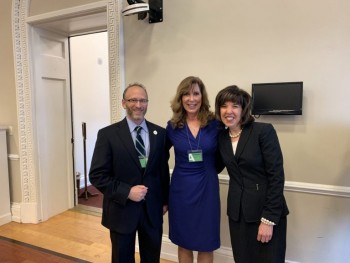NTCA has had a long and very productive working relationship with Anne Hazlett, beginning with her work as the top Rural Development policymaker at USDA under Secretary Perdue. While we were sad to see her leave, her departure simply meant a new role focusing on issues critical to rural America that deserve the policy attention she was willing to give to it – the opioid epidemic and its impact on rural America.
Anne is now the Senior Advisor for Rural Affairs at the Office of National Drug Control Policy (ONDCP – since we like acronyms so much here in DC). In this still relatively new role, she is working across the federal government to equip rural leaders with tools to address drug addiction in rural America. She called Josh Seidemann and I a few months ago to share that she and her team were looking to create a rural community action guide to help local leaders better access resources and address issues on the ground with this unprecedented drug crisis our country is experiencing. While we were not originally on her radar – which included recovery experts, local mental health resources, housing specialists, law enforcement associations and local leader groups – she called to say that every discussion the partners around the table raised seem to have a pull back to the importance of broadband and connectivity in drug prevention and recovery efforts and we were asked to submit a chapter on the role that broadband can play in this critical effort on the local level. Josh did a masterful job submitting a section for our industry and we were honored to be invited to join our fellow partners and White House officials for the release of this community action guide last Friday. As noted, small towns have big problems.
Walking into the room was like walking into an NTCA sponsored third party event – from the National Rural Hospital Association to the Farmer’s Union to the National Association of Counties, the National Rural Health Association to CoBank and even former FCC Commissioner Deborah Tate. All convened for a discussion so critical to our country since addiction impacts every community – regardless of color, income, religion – it’s hard to find families that have not had to face this challenge head on. It is certainly one we have faced with the fatal overdose of my own nephew 9 months ago. Maybe it’s become a bit personal for me but honestly, it should be personal for all of us.
Having the Surgeon General of the United States, a most impressive Dr. Jerome Adams, share not only his own story impacting his family but his thoughts on how this epidemic is impacting our country and our entire health system was powerful. He issued the first Surgeon General Advisory in 13 years, urging more Americans to carry Naloxone, an FDA approved medication that can reverse the effects of an opioid overdose. He also stressed the power of broadband in both treatment and recovery, keeping those in recovery from being isolated to it being an engine to allow them to look for jobs and housing. Congressman John Joyce (R-PA), a physician serving in Congress (and who stayed for the entire event – most unusual for a Member of Congress) noted that dealing with this issue knows no political boundaries.
Key take-always for me from the morning? We need to eliminate the stigma and retool thinking of drug addiction as a substance abuse medical issue. Money is available but is most effective when put in the hands of local communities to best address their issues and resource needs. Broadband has numerous uses in recovery in particular and local broadband providers can be a key player working with their local health care officials and even in helping to facilitate the connectivity in a spoke and hub system for recovery centers across a geographic area. A lot to ponder…
All the more reason I am so excited that Anne Hazlett will be joining us in Phoenix at RTIME in a few weeks to share more of her thoughts on the role the rural broadband industry can play in saving their own communities from this epidemic.

